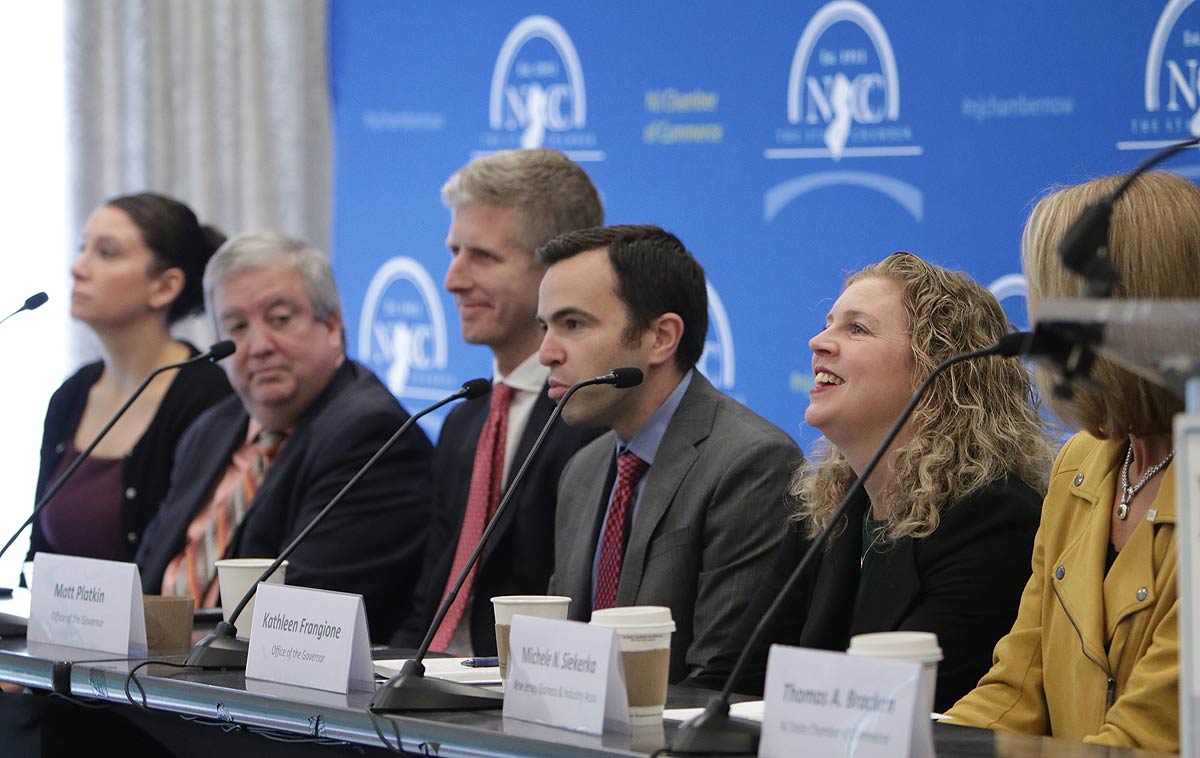Gov. Phil Murphy has made reforming New Jersey Transit a big priority.
He is high on making New Jersey a major player in wind energy.
And his administration is working on a new set of business incentives to lure and retain companies and new jobs to the Garden State.
This is according to three of the governor’s key advisors who addressed business leaders Oct. 10 at a breakfast presented by the New Jersey Chamber of Commerce and the NJBIA.
Taxes
Perhaps the biggest revelation came when Murphy administration Chief Counsel Matt Platkin suggested that it would not be surprising for the governor to consider a sales tax increase and an income tax increase on millionaires to pay for initiatives related to workforce development, schools and other areas. “New Jersey has a revenue problem,” Platkin said. “You can’t make investments if you don’t have the resources to make them.”
Platkin was joined by Chief Policy Advisor Kathleen Frangione and Deputy Chief of Staff for Economic Growth Joe Kelley for the wide-ranging breakfast discussion.
New Jersey Transit and Gateway
New Jersey Transit, which has become infamous for performance problems, is “front of mind every day for the governor and every single member of his team,” Frangione said. “After years of underfunding, we are confident we are making investments where we need to.” The Murphy administration has tripled the state’s subsidies to New Jersey Transit in this year’s state budget, but the mass transit agency still does not have a dedicated revenue source.
“The governor frequently reaches out to his staff to check on whether trains are running on time,” Frangione said. “I can attest we get text messages from the governor early in the morning,” she said. “It’s about making the connections with New York City and making our economy thrive.”
Similarly, the governor is working on the Gateway Project – including replacing the Portal Bridge and constructing a new tunnel under the Hudson River. This major project is expected to rely on federal funding – which has long been tricky to secure.
In a recent development, Gov. Murphy and U.S. Sens. Bob Menendez and Cory Booker have convinced the U.S. Coast Guard to ban boats from going under the 109-year-old Portal Bridge at rush hour, which means trains will no longer be stopped at those hours while the drawbridge is opened.
Clean Energy
Off-shore wind energy also is a priority to Gov. Murphy, Frangione said. “The Governor is pushing us to make sure we thrive in this nascent industry,” she said.
Wind is part of the administration’s goal to get the state to 100 percent clean energy by the year 2050. The proposed plan has called for more investment in both wind and solar, as well as nuclear energy, to reduce carbon emissions.
Frangione echoed the administration’s stance that energy prices must not rise sharply while the state pursues clean energy goals.
Business Incentives
Another hot-button issue in Trenton is the state’s tax incentives for businesses, which expired on July 1. “There is progress being made to institute a new program,” said Kelley.
One key sticking point is whether to cap the programs. Murphy has argued for a firm cap so the state is not spending outside its means, while top lawmakers, including Senate President Steve Sweeney, said a cap would prevent New Jersey from attracting businesses and generating the economic benefits those companies would bring to the state.
“There are a lot of places we agree,” Kelley said. “The caps issue is where there is a little bit of disagreement.”
Other Initiatives
The advisors touched on a few other Murphy priorities, including:
- partnering with municipalities to develop property in and around mass transit stations.
- investments in public schools, including pre-k expansion efforts, STEM initiatives, and bridging the gaps between student skills and the jobs of the future in New Jersey.
- a new website (Business.NJ.gov) designed to help business owners and entrepreneurs navigate the registration and permitting process across the state’s agencies.
“Regardless of whether you think the governor is too progressive or focuses on a particular sector, at the end of day the governor is trying to (foster) an economy that works for all citizens and all businesses, and that kicks off the state as a leader in the innovation economy,” Kelley said.
Thank you to our sponsors: Advocacy & Management Group and Wells Fargo.
